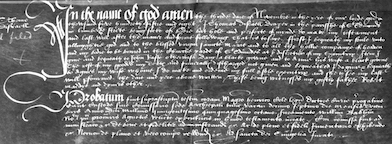Why'd Germans have a different alphabet way back when?
- Stefan Israel
- Sep 26, 2017
- 2 min read
They didn’t, actually, but their version of the alphabet was very different from what we use now. Most of Europe uses the Latin alphabet, but there was considerable variation in handwritten Latin already in the Roman era, and local variations only increased during the Middle Ages.
Just take a look at the way the English alphabet looked like in Shakespeare's day. Some of it resembles what modern English, but some you wouldn’t immediately recognize. Here’s a whole entry in English of the 1500’s.
You might figure out the first words, “Jn the name of god amen”, but after that, the going gets tough, and it doesn’t help that they used plenty of Latin and abbreviations that we don't. Check out the translation and transcription from 16th century English (and Latin) into today's English.
German had its own peculiarities, and worse- for centuries, different German regions used different written standards. It was in the 1700’s that a single standard fully won out across the German-speaking territories, and even today, Germany, Austria and Switzerland still have some minor differences in spelling and the like - and that will be another post.
Those old regional spelling traditions still show up in proper names - names of places and of people- the ‘piper/fifer name in High German is Pfeifer (or Pfeiffer) (“P-FIE-fer”), but a North German might keep the old Pieper (“PEE-
per”), while a Rhinelander often keeps their old Peifer (“PIE-fer”); someone in Switzerland might still use Pfiefer (“P-FEE-fer”), while a Bavarian might be Pfeifferl (“P-FIE-fer-ul”). That too ’s a subject for a whole different post.
Here’s an example of some older German letters: you'll surely recognize some of them easily, and some are wildly different from what we are used to.

That’s part of the challenge of reading the old scripts- the very letters differ so much, by region, by century, quite aside from the variation between any two writers.
In the next blog post, we'll look more at how the old writing has changed.
~~~~
Would you like to share this piece with your audience? You have full permission to share as long as you include Stefan's bio and this link to sign up and keep in touch with us.
















